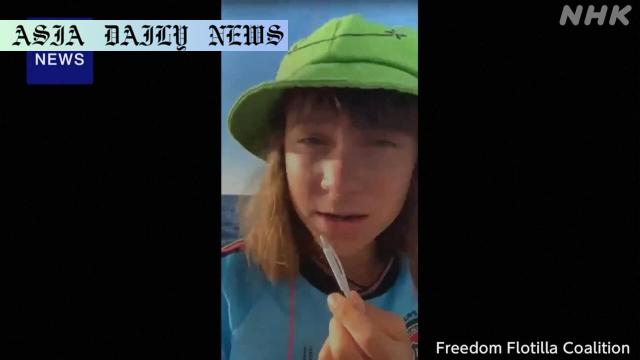Gaza: Israel thwarted a boat carrying aid supplies, including food and medicine, and activists like Greta Thunberg before it could reach Gaza.
Israel blocks an aid boat, led by Greta Thunberg, enroute to Gaza.
The aid boat carried supplies like food and medicine for the enclave.
13 Palestinians were killed near aid centers amid continuing attacks in Gaza.

Israel Blocks Aid Boat Enroute to Gaza
In a controversial move, Israeli forces prevented an aid boat carrying humanitarian supplies and Swedish environmental activist Greta Thunberg from reaching the besieged Gaza Strip. The vessel, operated by a human rights organization, was aimed at delivering food, medicine, and essential supplies to the inhabitants of the enclave. Israeli officials confirmed that the boat was diverted and its passengers would be returned to their respective countries.
The blockade of the Gaza shoreline, which has been under siege for years, regularly disrupts efforts to provide humanitarian aid. Israeli Defense Minister Israel Katz asserted that preventing the boat from docking in Gaza adhered to existing enforcement measures. The country cited security concerns as the basis for halting the mission. The activists aboard the vessel stated that the boat was boarded during the night, preventing it from reaching its intended destination. The interception has provoked strong condemnation, renewing debates on the humanitarian crisis unfolding in the region.
Continuing Violence and Casualties in Gaza
The situation in Gaza remains dire, with ongoing violence exacerbating the region’s woes. On Sunday, Palestinian media reported the deaths of 13 civilians in Israeli-led attacks near centers designed to distribute US-backed aid. These casualties highlight the devastating impact military operations have on the conflict-ridden civilian population. Despite international calls for peace and resolution, the crisis in Gaza shows no sign of abating.
The violence near United States-endorsed aid centers underscores the urgency for diplomatic intervention. While humanitarian aid is vital, the restrictive conditions imposed by an enduring blockade cripple efforts to alleviate the suffering of Gaza residents. The strained access to resources and escalating violence further aggravates the plight of civilians facing hardships on multiple fronts.
Global Attention and Activism
The involvement of high-profile activists like Greta Thunberg shines a light on the humanitarian disaster in Gaza. Thunberg’s association with the mission to deliver aid underlines the broader international attention on the plight of civilians. However, Israel’s decision to intercept the boat has drawn criticism, as it raises questions about the balance between security and humanitarian obligations. Activists argue that securing the welfare and rights of Gaza’s residents should not remain subordinate to political and military agendas.
Organizations worldwide have called for more targeted international intervention to ensure the safe delivery of essential supplies to Gaza. The plight of its residents serves as a stark reminder of the far-reaching human impact of blockades, violence, and political strife. The blockade’s effects extend beyond physical devastation, permeating the social, economic, and healthcare aspects of everyday life in Gaza.
International Response: What Can Be Done?
International bodies, including the United Nations and various non-governmental organizations, have long advocated for an end to the blockade and a more humanitarian approach to the Gaza conflict. The continuing cycle of violence, as evidenced by daily casualties, reinforces the need for robust peace-building measures. However, achieving such objectives remains an uphill battle given the complexity of geopolitical interests surrounding Gaza’s territory.
Efforts to improve Gaza’s situation must address the underlying issues of inequality, resource shortages, and freedom of movement. Without addressing these root causes, the region will likely remain mired in cycles of conflict and deprivation.



Commentary
Humanitarian Crises and Security Concerns: A Delicate Balance
Blocking the aid boat headed to Gaza represents a critical intersection of humanitarian concerns and security policies. On one hand, Israel’s decision to intercept the vessel is grounded in its ongoing need to address potential threats—an issue the country has long grappled with. On the other hand, this stance further exacerbates an already dire humanitarian situation in Gaza, where residents endure severe shortages of food, medical care, and shelter. The ethical question arises: Is prioritizing national security over global humanitarian norms justifiable in such circumstances?
Bringing Global Attention to Local Crises
The participation of renowned environmental activist Greta Thunberg in the aid delivery efforts reflects how global figures are spotlighting regional crises previously overshadowed by more visible conflicts. By lending her visibility to this mission, Thunberg amplifies calls for international accountability to help alleviate Gaza’s humanitarian struggles. Her involvement emphasizes how interconnected global challenges, from human rights to environmental sustainability, share a platform of urgency within international activism.
The Larger Implications of Blockade Policies
The Gaza blockade illustrates broader issues concerning the power dynamics between sovereign security measures and international humanitarian law. For nations like Israel, the calculus of allowing humanitarian aid frequently collides with initiatives aimed at neutralizing security threats. Nonetheless, such blockades often strain diplomatic relations and generate global backlash, potentially undermining the long-term objectives of regional stability and peace.
It is essential for global leaders and organizations to reassess the current frameworks through which aid becomes a political tool. The ongoing strife in Gaza serves as a case study for the moral and practical complexities inherent in modern geopolitical crises.